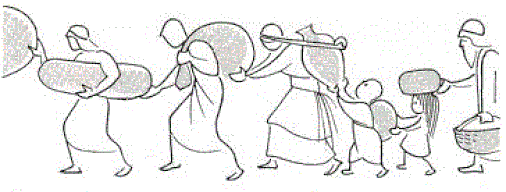
ויהי ממחרת ויאמר משׁה אל־העם אתם חטאתם חטאה גדלה ועתה אעלה אל־יהוה אולי אכפרה בעד חטאתכם׃
וישׁב משׁה אל־יהוה ויאמר אנא חטא העם הזה חטאה גדלה ויעשׂו להם אלהי זהב׃
ועתה אם־תשׂא חטאתם ואם־אין מחני נא מספרך אשׁר כתבת׃
׃
The next day Moshe said to the people, "You have committed a terrible sin. Now I will go up to Adonai; maybe I will be able to atone for your sin." Moshe went back to Adonai and said, "Please! These people have committed a terrible sin: they have made themselves a god out of gold. Now, if you will just forgive their sin! But if you won't, then, I beg you, blot me out of your book which you have written!" (Exo 32:30-32)
THE MARVELLOUS MECHANICS OF VICARIOUS REDEMPTION!
The Hebrew word for 'atone' in Moshe's proposal to the people of Israel, "... Maybe I will be able to atone for your sins..." uses the word "אכפרה", a word which literally means 'to cover', in the sense of one covering for someone else's transgression or debt. Another related word is "Kippur", as in "Yom Kippur/Day of Atonement."
This type of covering is not accomplished by deleting a debt or a transgression, but by paying it. So Moshe, who at that time was guiltless of the transgression of the Golden Calf, was offering to take upon himself the guilt of the whole ordeal. He was offering to do so not only for the nation of Israel, but for his brother Aaron also I sometimes hear people talk negatively about Aaron and the events that led to the Golden Calf. But Moshe's attitude is the gold standard on the issue, and we should rather take heed to emulate his reaction.
The golden calf event defines for us the idea of redemption by 'חן', a word usually translated as "grace," and often attributed the meaning of "undeserved forgiveness." The truth is that that word may be better translated as "favor", which Moshe certainly had with HaShem (Ex 33:12). The difference with grace and favor, is that "favor" is earned through obedience and faithfulness. Just like a child earns the favor of his parents or teachers by doing that which pleases them, we earn HaShem's favor by our obedience. By the same token, we can lose it by our disobedience. Moshe had earned HaShem's favor by obedience, and Israel lost it by disobedience (Heb 3:2).
What Moshe did next is at the heart of what any would-be leader for HaShem, any leader in the name of our Master should do. Here is how it went (and the Hebrew is much clearer on this than the English text.)
Favor with HaShem is like credit. Sin is like a debt. That is why the prayer says, '... forgive us our debts, as [in the same manner as] we also have forgiven our debtors. ... For if you forgive others their trespasses [their debts towards you], your heavenly Father will also forgive you, '(Mat 6:12-14). HaShem had previously promised that He would come live among His people and take them to the Promised Land. That was HaShem's marriage proposal and betrothal with Israel. After the golden calf incident, as a groom disappointed at the indiscretions of his wife to be, HaShem called off the wedding.
In the beginning of the text of Moshe's negotiation with HaShem (Ex 33:12-17) for Israel, HaShem already started to refer to Israel as, "Moshe's people." That was bad news!
To this nuance Moshe reminds HaShem that they are "His" people. Then HaShem makes an offer to Moshe. He suggests that He will go "with him" [meaning, not with the rest of the people] to the Promised Land. Now, Moshe could have thought of saving his own skin and tell Israel "Tough luck for you rebels! Bye!", but Moshe doesn't go for the deal.
As the wise diplomat that he is, Moshe decides to invest his earned credit, or his won favor, with HaShem. He then continues the negotiations by using the terminology, "Me and the people ...", in essence, Moshe sides with sinful Israel though he is guiltless of the sin of the golden calf. This implies now that if HaShem is to punish Israel, He would also have to punish Moshe, but since Moshe hadn't sinned, HaShem would be found unjust. This was the same argument that Abraham used in his negotiations with HaShem for the rescue of his nephew Lot (Gen 18:22-33).
This negotiation is an earthly blueprint of what our Master Yeshua did for us. Sinless Yeshua had "earned" favor with HaShem by always doing those things that please Him (obedience) (John 8:29). But instead of staying and enjoying HaShem's favor in the halls of the heavenly kingdom, much like Moshe did, He came to "side" with sinful us, so that like Moshe, He could negotiate for us in the sight of his Father using the terminology, "Me and Your people." As a result, we are allowed to nestle under the favor that He Himself received from HaShem. No wonder that the Redeemer to come was called 'one like Moshe!' (Deut 18:15).
This same Yeshua one day said as he was praying to the Father, "Just as you sent me into the world, I have sent them into the world." (John 17:18). In essence, we are to do the same for others as Moshe and Yeshua did for us.
It is meritorious to take the blame for someone else for the sake of peace and harmony, especially if one claims to be a leader of HaShem's people . To be able to do that and trust HaShem for the outcome is actually a sign of great maturity in understanding the heart of the nature of our role as leader for HaShem's people. Paul brought it up to the Corinthians. Unable to legislate issues between themselves, they besmirched their public image as well as HaShem's name in Corinth by enrolling secular lawyers. To that Paul exclaimed, "Actually, if you are bringing lawsuits against each other, it is already a defeat for you. Why not rather be wronged? Why not rather be cheated?" (1 Co 6:7).
To get back to Aaron, he redeemed himself later. At the time of Korah's rebellion, the Torah tells us that.
(17:9) Adonai said to Moshe, (17:10) "Get away from this assembly, and I will destroy them at once!" But they fell on their faces. (17:11) Moshe said to Aharon, "Take your fire pan, put fire from the altar in it, lay incense on it, and hurry with it to the assembly to make atonement for them, because anger has gone out from Adonai, and the plague has already begun!" (17:12) Aharon took it, as Moshe had said, and ran into the middle of the assembly. There, the plague had already begun among the people, but he added the incense and made atonement for the people. (17:13) He stood between the dead and the living, and the plague was stopped. Num 17:9-13, (16:44-48 CJB)
MAY WE ALSO BE LIKE MOSHE, AHARON AND YESHUA. WHENEVER NECESSARY, MAY WE TAKE THE WRONG UPON OURSELVES IN ORDER TO CREATE PEACE WITHIN OUR FAMILIES AND COMMUNITIES, THEREBY AND EXTENDING HaShem'S FAVOR ONTO OTHERS. MAYBE THIS IS THE MEANING OF
"How blessed are those who make peace! for they will be called sons of God.
(Mat 5:9 CJB)
THIS IS ALSO VERY GOOD ADVICE FOR MARRIAGES!
R' GAVRIEL LUMBROSO



 RSS Feed
RSS Feed